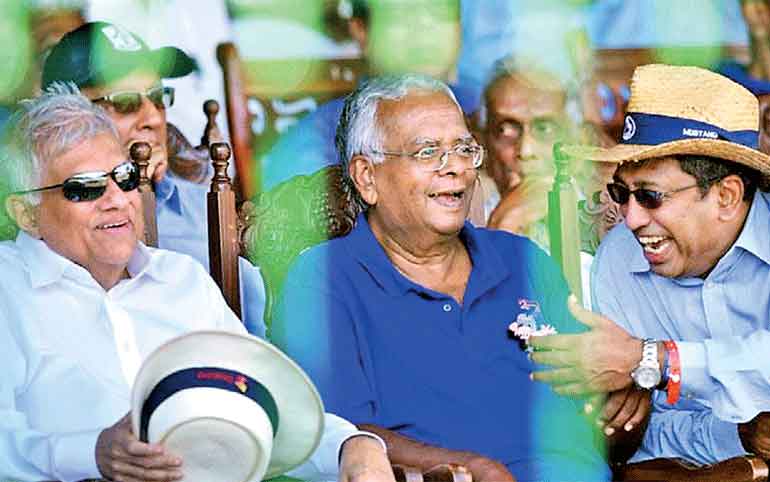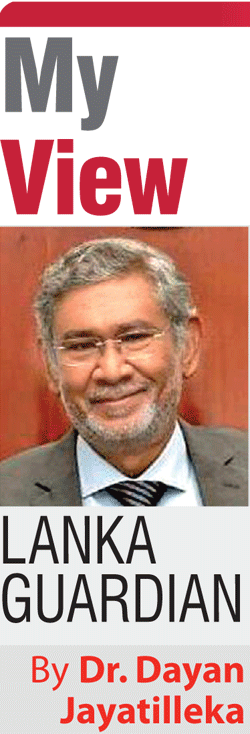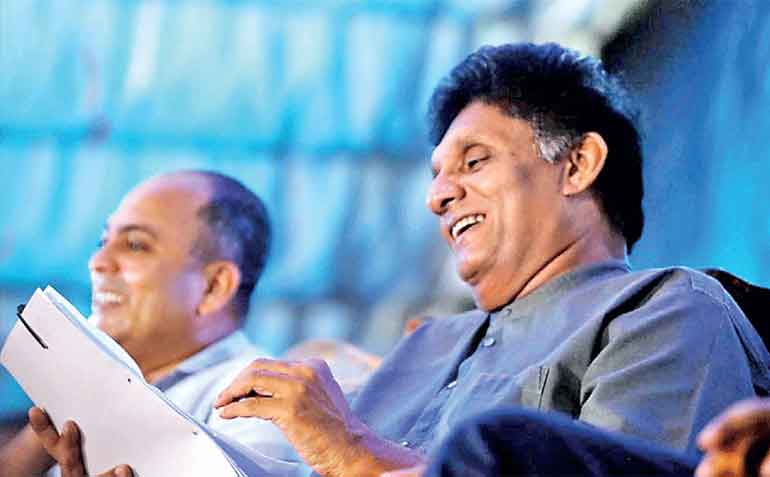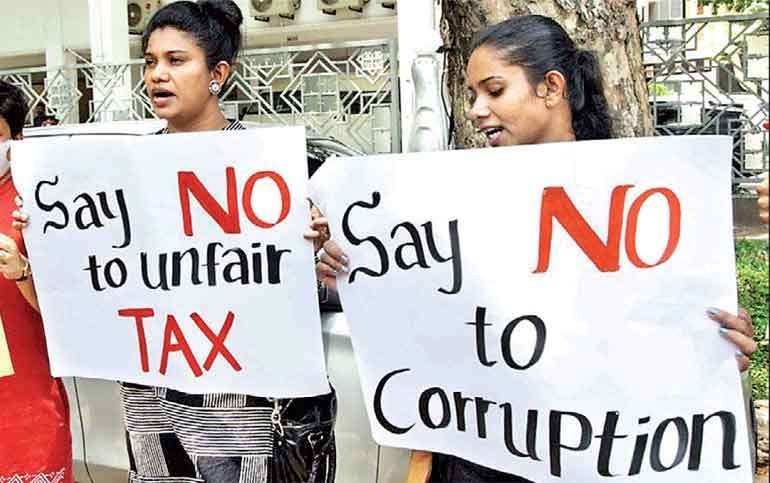Monday Feb 16, 2026
Monday Feb 16, 2026
Thursday, 23 March 2023 00:53 - - {{hitsCtrl.values.hits}}

The IMF tent
The IMF agreement is the latest of several landmark initiatives that Ranil Wickremesinghe has taken in his long career in politics. Each one of them had some logic but was warped by the personal imprint of excess and extremism; of the lack of prudence and pragmatism. Therefore, each of the moves caused a backlash that led him and the Government or the Opposition he represented in a far worse situation than before his initiative. It is illogical to assume that the Wickremesinghe-IMF agreement will be any different. Indeed, it is shaping up to be the biggest disaster of all
 In a statement after the discussion on Sri Lanka by the Executive Board, the IMF’s Managing Director Kristalina Georgieva released a statement which said, among other things, that “…Institutions and governance frameworks require deep reforms”.
In a statement after the discussion on Sri Lanka by the Executive Board, the IMF’s Managing Director Kristalina Georgieva released a statement which said, among other things, that “…Institutions and governance frameworks require deep reforms”.
In Sri Lanka, a republic which constitutionally enshrines the people’s sovereignty, who should decide on whether and which “deep reforms of…governance frameworks”, are required? Obviously the sovereign people. But who will actually decide at a time when the electoral process has been indefinitely suspended by an unelected ruler? The President-without-a-popular-mandate, his officials and IMF executives in Washington DC?
The core strategy of the IMF, which is the fetishisation of de-inflation and savage shrinkage of the economy to achieve it, is the deadly weakness of the whole program, which explicitly expressed in its Report, and confirms the consistent critique made by Opposition Leader Sajith Premadasa:
Georgieva’s letter had more constructive suggestions and good news for the citizens:
The IMF’s Report itself (dated March 6th) is more explicit:
The combination of the ongoing tax reforms which tax the professionals more heavily than the corporates, fully market-driven fuel/energy pricing and unmanaged market determination of the value of the rupee, will certainly cause a ‘deep reform’ downward, a ‘real depreciation’ in the living standards of the citizens.
The agricultural sector and the peasantry are bound to be hit hard by the agreed-upon reforms, or as in this case, counter-reforms, since the Report stipulates “Reforms to improve the private sector’s access to land…”
This goes completely against the logic of the country’s first ever presidential task force, created by President Premadasa for the redistribution of state land not to the private sector but to the landless. If by contrast, the private sector gains preferential access to land, the main criteria in the choice of crops or indeed the choice between agriculture and any other use, will not be food security and sovereignty but corporate profit.

Sajith at Kolonnawa
‘Good Old Boys’ Club
Ranil’s agenda has always been far too much at variance with the island’s ethos. Yet, he has always been given to hubris, as in 2001 when he signed the Ceasefire Agreement with Velupillai Prabhakaran. In his speech to the 32nd District Interact Club in the aftermath of the Royalist victory in the Big Match he seemed unaware that the Royal-Thomian Big Match has little resonance in the country at large at the best of times, which these certainly aren’t. (RW promises Royal victory for crisis-hit Sri Lanka | Daily FT)
As the Big Match was in progress, SJB and Opposition Leader Sajith Premadasa, who studied at St. Thomas’ Prep and Royal College and captained cricket at an English public school, was addressing meetings with Mujibur and Marikkar in Grandpass and Kolonnawa. Asked by SJB-SVB rising star Hirunika Premachandra whether he wouldn’t accept the flurry of invitations inundating him to attend the Royal-Thomian, he had replied, “How can I go, Hirunika, when people are suffering so much? It is the wrong message to send.”
Meanwhile by contrast the SJB’s chief economist Dr. Harsha de Silva was captured by the cameras in deliriously exuberant conviviality with Ranil in ‘the IMF tent’ at a moment when the latter had strangled the local authorities election. Harsha has since tweeted his commendation of the President’s ‘commitment’ and the ‘professionalism’ of the CB Governor and the Secretary/Treasury in securing the IMF package.
Despite President Wickremesinghe’s post-Royal-Thomian high spirits and his determination to drive for ‘victory’, he is doomed to fail for the same reason that he has failed so often before and his few successes have been ephemeral. He always turned every rare success into failure because his ideology-driven delusional maximalism has fallen well short of mass acceptability and tolerance.
Driving under ideological influence
President Wickremesinghe is caught in yet another contradiction, namely that between the ambition and weight of his (economic) agenda and the smallness and slenderness of his popular (political) base.
In the wake of successive assassinations of UNP leaders by Prabhakaran’s LTTE, Ranil Wickremesinghe took over the reins of the UNP, the island’s largest single party. He reduced the UNP in 25 years to a party without a single elected member (that includes himself) in Parliament.
The IMF agreement is the latest of several landmark initiatives that Ranil Wickremesinghe has taken in his long career in politics. Each one of them had some logic but was warped by the personal imprint of excess and extremism; of the lack of prudence and pragmatism. Therefore, each of the moves caused a backlash that led him and the Government or the Opposition he represented in a far worse situation than before his initiative.
It is illogical to assume that the Wickremesinghe-IMF agreement will be any different. Indeed, it is shaping up to be the biggest disaster of all.
The obvious counter-argument is that this time, for the first time, Ranil is the President. As Gotabaya Rajapaksa realised last year, that’s no guarantee of anything even if you’ve been handsomely elected, and have a famous brother and a strong party backing you. In the case of Wickremesinghe, he has none of those assets.
The main hallmark of the political career of Ranil Wickremesinghe has been his practice of the politics of polarisation. This in turn stems from his ideological extremism. His has never been the politics of social consensus.
It is this cluster of characteristics that has led to repeated failure and is the ticking timebomb beneath his apparent and highest success of rapid accidental ascent unelected by popular ballot, to the presidency, and now securing an agreement with the IMF.
What is Ranil Wickremesinghe’s track record since 1977 that makes me think that a disaster is ‘highly probable’ as the British put it (when referring to matters Russian)?
In 1978, the JVP was at its most moderate and weakest on the university campuses. The UNP had won a landslide victory in 1977, the UNP students’ union was influential for the first time in a few campuses, and in any case the entire ethos has shifted. The Government was able to roll-back partially, the dreadful policy of standardization of marks at university entrance with only tepid protests. Then came the two issues of Ranil Wickremesinghe’s White Paper on Education and the Private Medical College. The protests included a massive student march on Galle Face Green which was charged by mounted police, and a hunger strike at Katubedde campus (now Moratuwa University). In the early 1980s, the ‘pacified’ universities of post-1977 had become JVP bases and produced the most militant cadres of the second southern insurrection of 1986-1989. That was Ranil.
It is a triple counterrevolution—economic, social and political—which promises to provide the most propitious objective (material) and subjective (normative) conditions in 75 years of Independence, for revolution
Fast forward to 1997. Having taken over the leadership of the UNP in 1994 and pledged to follow ‘Social Democracy’ and ‘Premadasa policies’ (not least in a full-page interview given to me in the Sunday Observer), Ranil made a hard swerve to the ideological Right, doing something that no UNP leader had ever done even during the years of the Cold War when such a move may have been lucrative. He officially integrated the UNP with the global rightwing and centre right parties clustered in the International Democratic Union (IDU), the founding pillars of which were the US Republican party and the UK Conservatives. He followed this up by signing, as did President Chandrika Bandaranaike Kumaratunga, the Liam Fox agreement which committed the UNP to the conciliation of the LTTE.
The IDU-driven ideological shift away from Premadasa development policy to free-market fundamentalism and the Liam Fox-driven shift from a tough-on-terrorism policy to Chamberlain-like appeasement, shattered the UNP’s Sinhala base vote including among the peasantry, never to be rebuilt.

University teachers protest
In 2001 Prime Minister Ranil Wickremesinghe signed a lopsided ceasefire Agreement with the LTTE. He wanted Chandrika to co-sign it and when she asked for 24 hours to study it he refused, saying he had promised to sign it at 5pm on that very day, when Prabhakaran would be signing it at another venue.
At the time I made the point in published writings and public lectures that the LTTE belonged to that category of non-state actors whose totalitarianism and maximalism made it impossible to have a negotiated peace with; that war was the only solution and that it could be won, BUT if one wanted to go the negotiations route yet again, one should adopt a Realist approach which entailed studying successful negotiations such as Northern Ireland’s Good Friday Agreement. Mine was a ‘voice in the wilderness’ until John Hume came to town.
Ranil’s CFA was so unbalanced and unilateral as far as Southern politics went, that a man who won a Nobel Prize for successful peace-making, Ireland’s John Hume, went on the record in Colombo saying that if this were supposedly the framework for negotiations and peace it had best be torn up because it was doomed to fail.
The CFA had an international superstructure in the form of the Co-Chairs, which included the USA.
The CFA was so colossal a failure that not only was Ranil was dismissed by President Kumaratunga and not returned for 15 years to the PM-ship by an angered electorate, but a robustly nationalist Mahinda Rajapaksa was elected President and felt compelled by public pressure to respond to the LTTE’s aggression and bust through the CFA, upending the Co-Chairs superstructure, and fighting and winning the war.
15 years after he was last elected PM, Ranil was returned to that office, whereupon he promptly drafted (according to an admiring Mangala Samaraweera) and sought and obtained western co-sponsorship of a resolution at the UN Human Rights Council in Geneva which, inter alia, agreed to foreign judges, foreign prosecutors and foreign counsel on Sri Lankan soil, adjudicating allegations of war crimes and crimes against humanity.
He twinned that with a process of drafting a new Constitution which would abolish the executive presidency and delete the word “unitary” from the Sri Lankan basic law.
In 2016 in a TV interview to mark the first anniversary of his return to the Prime Ministership, he made two references to me for having spearheaded as a public intellectual, the resistance to these twin measures.
After this stint as PM, the citizen-voters wiped Ranil out at the 2020 elections, defeating him in his home base Colombo and refusing to elect a single member of the UNP to the legislature.
Ranil’s 2015 Geneva resolution was so colossal a disaster that while PM, his (UNP) foreign minister Tilak Marapona began to back away from it at the UNHRC, President Gotabaya Rajapaksa unilaterally pulled out of the resolution and to cap it all Ranil as President has chosen to maintain Gotabaya’s stand and his foreign minister Sabry resolutely rejects the 2015 resolution while addressing the UNHRC.
It is this Ranil Wickremesinghe, with this disastrous track record of unilateral, polarizing, unsustainable, blow-back triggering initiatives with his signature attached, who has just entered an agreement with the IMF and is about to do so with the Adani group over Trincomalee. I wouldn’t sell him any political insurance. He’s just about the worst (political) credit-risk in Sri Lankan public life.
Mangala Samaraweera famously said that “Sir John was the best leader we ever had” and “Ranil Wickremesinghe was the best President we never had”. Ranil is now the President we have. Mangala Samaraweera is going to be proven correct if only in his placement of Sir John and Ranil in the same category. The category of socially insensitive leaders who catalyze a radical backlash which alters everything.
Scenarios and outcomes
Ranil chose to reject an appeal to reveal to Parliament the details of the Staff-level agreement with the IMF. Had he assented, he could have taken the text of a more modest but more consensual perhaps bi-partisan document to the IMF as the Sri Lankan position. Instead, he chose as always, the option of unilateralism.
As an unelected President who even refuses to hold local authorities’ elections, he has no legitimacy to impose austerity and privatisation measures of a disaffected public. To make matters worse he has loaded his own economic ideas of 2001-2004 and 2015-2019, under the rubric “structural reforms which will unlock Sri Lanka’s growth potential” onto the same cart as the IMF package. It will, as always in his case, prove much more than the traffic can bear.
Public opinion polls run by the Harvard-educated Dr. Ravi Ranan-Eliya) show a much higher approval rating not just for the left over the right and the centre/centre-right, but more fundamentally for socialism over capitalism. This island has had two powerful attempts at social revolution and one at secession. These were eventually defeated and the democratic system and market economy survived for several solid reasons:
Those are the four corners of the Sri Lankan Social Contract.
The Ranil-IMF-Adani model is blasting these four pillars of stability and long-term continuity. The status quo has been rendered utterly untenable.
The prospective outcomes are therefore:
(1) Reformist social democracy.
(2) Classic democratic revolution (USA 1776, France 1789).
(3) Democratic revolution of a new type, a popular-democratic revolution.
(4) Anti-capitalist, socialist-oriented revolution.
(5) Military dictatorship of the Right.
(6) Populist left-inclined military dictatorship.
(7) Anarchy, breakup of the state, armed neo-tribalism/neo-gangsterism.
Far from being a great and unmitigated triumph, the IMF deal and its attendant commitments and implications have as an aspect, an unsustainable travesty. The majority of the citizens who just last year generated a tsunami that overthrew an ex-military ruler they elected, are being asked to shoulder the burden of a debt crisis they didn’t create, by a ruler they didn’t choose, who when he was Prime Minister, was greatly responsible for the debt crisis by amassing foreign private debt, and now as President is depriving them of democratic elections that are deeply rooted in the island’s political culture and is a fundamental right that generations of citizens have exercised for almost a century.
It is a triple counterrevolution - economic, social and political - which promises to provide the most propitious objective (material) and subjective (normative) conditions in 75 years of Independence, for revolution.